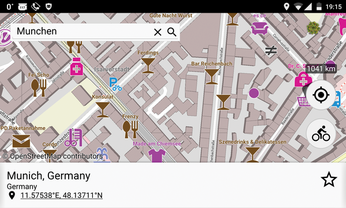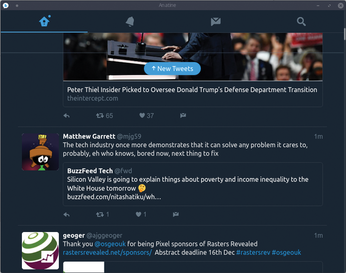Sparkling gems and new releases from the world of Free and Open Source Software
Marble Maps 1.0
It could be argued that Android is the most widely used and distributed version of Linux. And even though Google is seemingly fighting to make its new Android frameworks as proprietary as possible, its Android core remains open source and at the heart of other mobile open source operating systems. This may be why some Linux projects are expanding into Android development as an extension of their more traditional roots. The KDE project is one of those pioneering spirits. KDE Connect (above) links your phone to your desktop, while Marble Maps takes this further, testing KDE's long-promised platform agnosticism by porting the Marble libraries to Android and creating a whole new app for browsing OpenStreetMap data in the process.
Marble Maps itself is a navigation app that uses the same data and rendering routines as its desktop counterpart. This is evident from the first launch, where the vectors are rendered as finely as your phone's display will allow. On any screen with a high DPI, it looks amazing. It's also quicker than the standard open source OpenStreetMap app, OsmAnd, but it's also bereft of many of its features. There's the same routing planning you get at http://www.openstreetmap.org, but very little else. No control over caching, no plugins, no tracking, no importing – none of the features that make OsmAnd so useful. But this is just a first release, and because of the beautiful rendering and quick screen update, we'd still recommend Marble Maps as the app to use when you're lost in a city, just as long as that city is in Germany, where there's even 3D building data, or the rest of Europe or the USA where OpenStreetMap details are highest.
Project Website
Desktop Twitterer
Anatine 1.1.0
If there's anyone still brave enough to look at Twitter, it remains a social media platform that has its uses. It's unrivaled for its ability to capture news events as they unfold, for example, and there are still many Linux developers and open source advocates sharing their thoughts with the world via its 140 characters. But the initial glut of Linux clients that followed its launch way back in March 2006 have mostly dried out. It's seems most users are happy to use the now permanently web-bound Tweetdeck or stick with their old Twitter clients.
But there's also Anatine, which is definitely worth a look if you need a desktop client. Anatine isn't strictly a desktop application, though. It's built around an encapsulation of the mobile twitter site (mobile.twitter.com) using the Electron Node/Javascript and Chromium framework, which means it's basically a browser loading a single page. This also means you can customize the experience as if you were using a single application, and what's particularly good about Anatine is its use of keyboard shortcuts and a rather excellent dark mode implemented via easily editable CSS.
Anatine can be run directly from the download (although it's a zip bomb, so be careful) and needs a single login to get going. This is because it's using an official web portal, rather than accessing your account via a limited access API, which is what destroys many third-party Twitter clients. When logged in, Anatine is simple, quick, and looks great on-screen. It doesn't have the power of Tweetdeck, but neither does it eat up the same amount of RAM and resources, and it lets you easily keep on top of your Twitter updates or ignore them completely.
Project Website
Buy this article as PDF
(incl. VAT)
Buy Linux Magazine
Subscribe to our Linux Newsletters
Find Linux and Open Source Jobs
Subscribe to our ADMIN Newsletters
Support Our Work
Linux Magazine content is made possible with support from readers like you. Please consider contributing when you’ve found an article to be beneficial.

News
-
Linux Servers Targeted by Akira Ransomware
A group of bad actors who have already extorted $42 million have their sights set on the Linux platform.
-
TUXEDO Computers Unveils Linux Laptop Featuring AMD Ryzen CPU
This latest release is the first laptop to include the new CPU from Ryzen and Linux preinstalled.
-
XZ Gets the All-Clear
The back door xz vulnerability has been officially reverted for Fedora 40 and versions 38 and 39 were never affected.
-
Canonical Collaborates with Qualcomm on New Venture
This new joint effort is geared toward bringing Ubuntu and Ubuntu Core to Qualcomm-powered devices.
-
Kodi 21.0 Open-Source Entertainment Hub Released
After a year of development, the award-winning Kodi cross-platform, media center software is now available with many new additions and improvements.
-
Linux Usage Increases in Two Key Areas
If market share is your thing, you'll be happy to know that Linux is on the rise in two areas that, if they keep climbing, could have serious meaning for Linux's future.
-
Vulnerability Discovered in xz Libraries
An urgent alert for Fedora 40 has been posted and users should pay attention.
-
Canonical Bumps LTS Support to 12 years
If you're worried that your Ubuntu LTS release won't be supported long enough to last, Canonical has a surprise for you in the form of 12 years of security coverage.
-
Fedora 40 Beta Released Soon
With the official release of Fedora 40 coming in April, it's almost time to download the beta and see what's new.
-
New Pentesting Distribution to Compete with Kali Linux
SnoopGod is now available for your testing needs



